HOMILY FOR MASS OF THE 24TH SUNDAY OF ORDINARY TIME YEAR B

Live-streamed from St. Mary’s Basilica, Sydney, 12 September 2021
The Apostle of our age, St John Paul II, wrote many documents, delivered thousands of homilies and addresses, published books, plays, poems. In his programmatic first encyclical, Redemptor Hominis, he emphasised the centrality of faith in Jesus Christ before all else, as the key to the human person and human history, the answer to our search for salvation and purpose.[1] This age, he said, demands of Christians “a faith that is particularly aware, profound and responsible”.[2]
He walked his talk, through more than 1.1 million kilometres of pastoral journeys, reaching out to every corner of the globe, drawing the largest crowds in history and meeting more people than anyone.
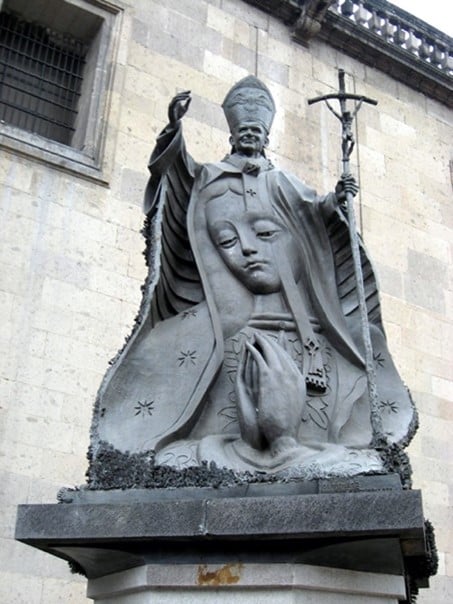
His first such visit, only weeks after his election, was to Mexico. As with his first encyclical, his homily in Mexico City focused on faith. He highlighted four dimensions of faith that he thought the Virgin Mary particularly demonstrated: seeking, finding, committing and enduring.[3] Some would be surprised that this great apostle thought questioning comes before all else. Yet even Mary asked her questions before accepting the mystery of the incarnation and assenting to her mission (Lk 1:26-37). So, too, in our Gospel today (Mk 8:27-35) we see questions flying between John Paul’s predecessor, St Peter, and the Christ of whom both were vicars.
Jesus encouraged questions and so people brought their questions to Him: What is truth? Are you the king of the Jews, the Messiah, the Son of God? Should we obey the Jewish Law and what is most important in it? Is it lawful to cure on the sabbath, to divorce, to pay taxes? How are we to pray, who is our neighbour, should we use the sword? How is it you know me, who is it will betray you, how will we know the end is near? What will heaven be like, will only a few be saved, what must I do to inherit that kingdom, who will be greatest there?
Jesus had His answers—indeed He is The Answer—but He also had His own questions: What is your name, who touched me, who are you looking for? How long has this one been suffering, do you think those who suffer are worse sinners, what can I do for you? Can you see now, were not ten made clean? Can’t we feed them, how many loaves do we have? What are you arguing about, what were you talking about on the road, who do you say I am? Will you follow me, or will you leave me also?
Jesus asks these questions of us and we of Him. In the dialogue of faith ours is no blind faith; we are not puppets, apps or fools. We’ve been gifted with intellect and freedom to ask our questions. We rightly want to understand God’s plan, not just assent to it, however incomplete our comprehension.
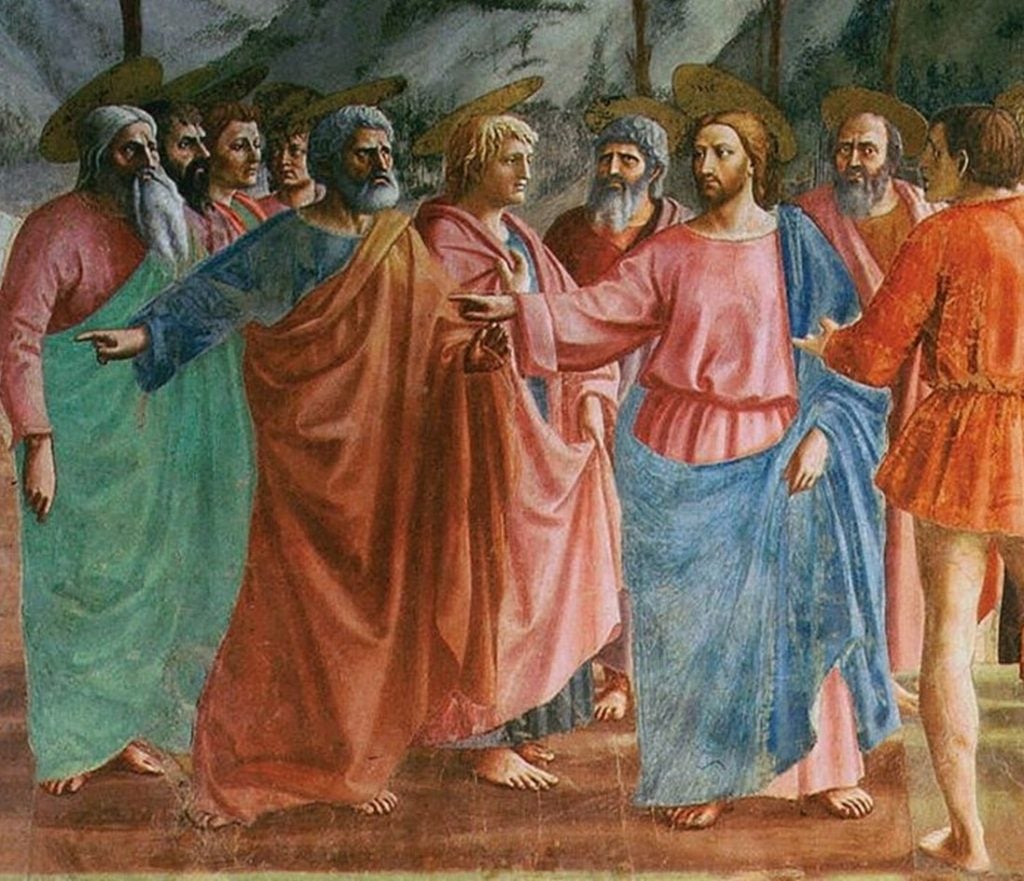
If the first stage of faith is the search, the second is the finding. As John Paul noted, reception is “the crucial moment of faithfulness,” when a person “accepts the mystery, gives it a place in his heart… opens up to being inhabited by something—by Someone!—greater than his own heart.”[4] So the Virgin responds ‘Fiat! Let it be done to me’ (Lk 1:38).
But where Mary’s reception is perfect, Peter’s is not. Though he acknowledges the mind-blowing reality that his friend and teacher Jesus is the Son of God, he doesn’t want a divine plan different to his own. He proclaims Jesus ‘Messiah’ but demands He be his kind of Messiah, that He think as men think, and act as Peter would. Peter is every one of us saying ‘Thy will be done—only, Lord, please line Your will up with mine’.
‘Get behind me,’ Jesus responds to us, ‘get back in line. If you want to be my follower, renounce your wilfulness and actually follow, think as I think, walk God’s way not your own.’
Next comes committing. Here the challenge is “to live in accordance with what one believes; to adapt one’s own life to the object of one’s obedience”;[5] to be consistent, even when it is challenging. As St. Thomas Aquinas reminded us: “The truth of faith includes not only inner belief, but outward profession, not only declaration of faith but actions that demonstrate that faith.”[6]
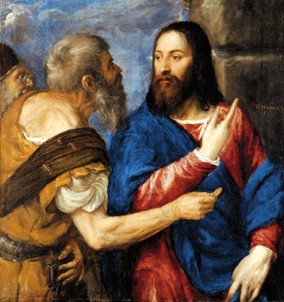
Get behind me, Jesus says to Peter, or else you’ll be a Σατανᾶ (Satana), an obstacle, a voice for the Enemy. Instead of saying ‘I will follow’ and then resisting whenever it’s challenging, be consistent. James makes a similar point in our epistle (Jas 2:14-18). Faith that does not pay out in good action is mere theory, fraud, moribund. It’s not that good works are more important than faith—as the Reformers protested that Catholics thought—nor that deeds are irrelevant and faith all that matters—as Catholics accused Protestants of thinking. No, James’ point is that faith and works are like body and soul. Works concretize or express faith; faith inspires and shapes deeds. Works conform us to Christ not just notionally but bodily; faith ensures this is not mere performance but telling the story of the soul. The proof of the pudding is in the eating, not the recipe. So get with the programme Peter.
Finally, John Paul suggested, faith also means constancy, enduring through thick and thin. We can all be faithful for a time, when things are going well and consolations come. But what about when there are trials, like pandemic, lockdowns, isolation?
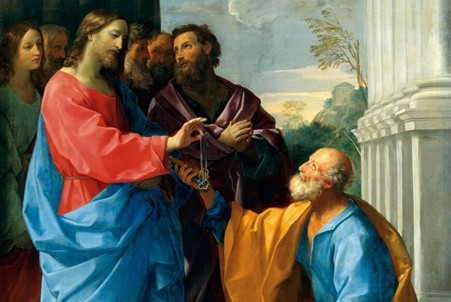
How will you be, Pete, when instead of skipping atop the water of life, you find yourself sinking beneath its waves? When instead of miraculous hauls of fish it’s empty nets, apparently fruitless preaching? You loved being with me when you saw my trans-figured glory, but how will it be when you see my terrified agony? When I’m on trial and people ask if you know me, will you confess me then as friend and master, Messiah and Son, as you just did, or will you deny me three times? How will you be when the sheep are scattered and you are taken where you’d rather not go?
The fact is: we can all be fair weather friends to Jesus. It’s easy when its easy. But faith is tested in the crucible of tedium, of opposition, of suffering. Faith means seeking and questioning, finding and receiving, living consistently and enduring constantly. As we saw last week: faith takes courage and needs hope.
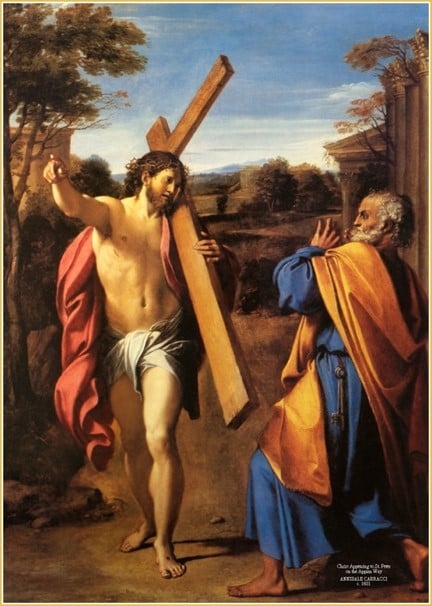
Faith, then, is not just something we get, choose, have; it is also something we are, live, do. So dare to dream and to do. Take up your faith not just notionally but intentionally, not just as a club-member but an active player, cross and all. Anyone who holds on to their will, comfort, life will lose it. But whoever gives their all for My sake, My Gospel, will save it for eternity!
We profess the faith of Peter in Jesus, the Christ, the Son of the living God, as we say: I believe in One God…
[1] John Paul II, Redemptor Hominis: Encyclical at the Beginning of his Papal Ministry (1979) https://www.vatican.va/content/john-paul-ii/en/encyclicals/documents/hf_jp-ii_enc_04031979_redemptor-hominis.html. Elected on 16 October 1978 he promulgated this encyclical on 4 March 1979.
[2] Redemptor Hominis 6. He also observed that “faith, too, must be investigated deeply, manifesting the magnitude of revealed mystery and tending towards an understanding of truth, which has God as its one supreme source” (19).
[3] John Paul II, Homily for Mass in the Cathedral of Mexico City, 26 January 1979 http://w2.vatican.va/content/john-paul-ii/en/homilies/1979/documents/hf_jp-ii_hom_19790126_messico-cattedrale.html
[4] Homily in Mexico City Cathedral, 26 January 1979.
[5] Homily in Mexico City Cathedral, 26 January 1979.
[6] Thomas Aquinas, Summa Theologiae, 2-2, 124.5
A warm welcome to St Mary’s Cathedral in Sydney, for this livestreamed Solemn Mass of the 24th Sunday of Ordinary Time. Yesterday was the 20th anniversary of the 9-11 attacks and so we pray for an end to terrorism, for peace in our times, and for healing for those who grieve.
This week the government made some announcements about their plans for reopening churches and other venues once vaccination rates hit certain thresholds. You can read my statement on the Archdiocesan website or my Facebook page. We look forward to that time, in the near future, when all the faithful, without discrimination, may gather for worship.
Today Pope Francis is in Budapest for the 52nd world Eucharistic Congress. At a time when many churches around the world have been closed and when many are yet to return to worship even where they have reopened, the Holy Father’s presence at the Congress is a reminder of the centrality of the Blessed Sacrament in Catholic life. Today Peter in our Gospel confesses Jesus as the Christ, and we join his successor Pope Francis in acknowledging the real presence of Christ, the Son of the living God, in our Eucharist.

